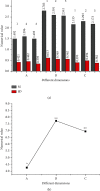Correlation between Parenting Style by Personality Traits and Mental Health of College Students
- PMID: 35936833
- PMCID: PMC9314183
- DOI: 10.1155/2022/6990151
Correlation between Parenting Style by Personality Traits and Mental Health of College Students
Retraction in
-
Retracted: Correlation between Parenting Style by Personality Traits and Mental Health of College Students.Occup Ther Int. 2024 Jan 24;2024:9872506. doi: 10.1155/2024/9872506. eCollection 2024. Occup Ther Int. 2024. PMID: 38298850 Free PMC article.
Abstract
At present, the mental health of college students in China is relatively poor. This work is aimed at analyzing the correlation between family parenting style and college students' mental health and providing a realistic basis for improving the mental health level of college students. Firstly, this work detailed the family parenting style, the influencing factors of family parenting style, and the theoretical basis of personality traits. Then, 300 college students in Anhui Province were selected as the research objects who answered the questionnaire on parenting style and the Revised Eysenck Personality Questionnaire Short for Chinese. Finally, statistical software was used to visually analyze the personality characteristics of college students, the overall situation of mental health, the impact of parents' education on college students' mental health, and the family parenting style of college students. According to the score of anxiety, the top 27% of the research objects are classified as the high-anxiety group, while the bottom 27% are classified as the low-anxiety group. The results show significant gender differences in the psychoticism and neuroticism dimensions of personality traits (P < 0.05). Besides, the educational level of parents has a certain influence on the mental health of college students, and the influence of mothers is even greater. College students feel more rejection, emotional warmth, and overprotection from mothers. Meanwhile, college students with mothers of different educational levels have significant differences in the scores of various dimensions of the mother's rearing style. However, there is no difference in this respect among college students with fathers of different educational levels. The average scores of emotional warmth from parents of the high-anxiety group are significantly lower than those of the low-anxiety group (P < 0.001). Moreover, the high-anxiety group has much lower average scores than the low-anxiety group in severe punishment, overprotection, and rejection of father and excessive interference, severe punishment, and rejection of mother (P < 0.001). There is no significant difference in their average scores of the partiality of father or mother between the high-anxiety group and the low-anxiety group. The results show that the parenting style based on personality traits has an impact on college students' mental health. This signifies that parenting style based on personality traits has an effect on college students' mental health.
Copyright © 2022 Minggui Ge et al.
Conflict of interest statement
The authors declare that they have no conflicts of interest.
Figures













References
-
- Ge Y. Psychological safety, employee voice, and work engagement. Social Behavior and Personality: An International Journal . 2020;48(3):1–7. doi: 10.2224/sbp.8907. - DOI
-
- Xiang Y., Zhao J., Li Q., Zhang W., Dong X., Zhao J. Effect of core self-evaluation on mental health symptoms among Chinese college students: the mediating roles of benign and malicious envy. Psychiatric Annals . 2019;49(6):277–284. doi: 10.3928/00485713-20190508-01. - DOI
-
- Godinic D., Obrenovic B., Khudaykulov A. Effects of economic uncertainty on mental health in the COVID-19 pandemic context: social identity disturbance, job uncertainty and psychological well-being model. International Journal of Innovation and Economic Development . 2020;6(1):61–74. doi: 10.18775/ijied.1849-7551-7020.2015.61.2005. - DOI
Publication types
MeSH terms
LinkOut - more resources
Full Text Sources
Medical

